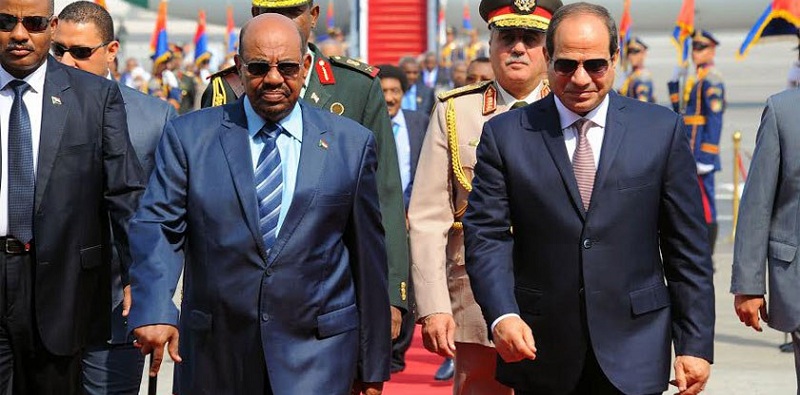Alwaght- Recently, the Egyptian-Sudanese relations began to deteriorate to an extent that Khartoum recalled its ambassador in Cairo on January 4. In a news conference on Saturday, the recalled Sudanese ambassador Abdelmahmod Abdelhalim implied that a war between the two African nations was not unlikely.
The ambassador warned that his country will take further escalatory actions against Egypt within days.
Abdelhalim told the journalists that his summoning was a step in a series of moves that could include “withdrawing of ambassador or expulsion of other country’s ambassador or breaking off the relationship and declaring war”.
The crisis between the two African neighbors dates back to decades ago, particularly after Sudan gained independence. The two disagree on the ownership of Hala’ib Triangle, Shalateen, and Abu Ramad, three border regions that have been a source of discord since Sudan’s independence from the British colonization in 1956. The disputed region is a 20,500 square kilometers land that is located between the two countries on the one side and restricted by the Red Sea on the other side.
In the 1990s, Egypt sent its troops to Hala’ib Triangle, a move pressing up the crisis to a new level. However, in the ensuing two decades, the dispute stood stock-still.
Aiming to put strains on Khartoum, Cairo over the course of the past two decades has supported the Darfur-based rebels’ fight against the central Sudanese government. But their tensions resurfaced in 2016 when Egypt transferred ownership of its two Red Sea islands of Tiran and Sanafir to Saudi Arabia. The agreement, which redrew the maritime border between the two countries, also unilaterally recognized Egypt's sovereignty over the Hala'ib Triangle.
In a move which was interpreted as a response to the Saudi-Egyptian island transfer deal, Sudanese President al-Bashir signed a deal with his Turkish counterpart President Recep Tayyip Erdogan and temporarily handed over to Turkey the Red Sea island of Suakin, a strategic Sudanese island and Sudan’s second port after Port Sudan. Reacting to the accord, Cairo sent thousands of its troops to a UAE military base in Eretria. The Egyptian military personnel deployment provoked the Sudanese authorities into shutting down their border with neighboring Eretria and deploying forces to the border region.
This is not the only issue stirring tensions between Cairo and Khartoum. Another source of dispute between the neighbors is the Grand Renaissance Dam project, underway in Ethiopia. Ethiopia is working on the dam, which will be the seventh-largest hydroelectric power plant in the world when completed. The dam is being built on the Blue Nile River, originating from the Lake Tana in Ethiopia and is located in the Benishangul-Gumuz Region of Ethiopia, only 40km east of the country's border with Sudan. The river meets White Nile River in Khartoum and together supply water to the Nile River.
The Grand Renaissance Dam has raised concerns about bringing famine to Egypt and so negatively affecting the Egyptian agricultural sector and even the fresh water, something igniting more tensions between Egypt and Sudan, which is seen on the side of Ethiopia in terms of the dam project. Ethiopia had planned to complete the project in 2017, but the Egyptian expression of concerns and argument that the dam will cut the Nile water sources delayed the inauguration. The project so far has cost Ethiopia $4.5 billion. Qatar, an opponent to the ruling regime in Egypt, has shown advocacy to the construction to pressure Egypt.
Turkey’s footprints
During his leadership of Turkey, Erdogan paid more than 30 visits to the African states. He intensified diplomatic work in the recent years and opened 39 more embassies in the African countries, a meaningful increase in its 12 embassies in 2002, when his Justice and Development Party took the power in Turkey. Earlier this month, Erdogan traveled to Sudan as part of efforts to expand influence in Central Africa, a trip that saw Turkey take control of the strategic Suakin region.
The important point is that the Sudan-Egypt tensions flared up not long after Erdogan’s trip to Sudan. On the other hand, this is the first time that Sudan threatens Egypt with the possibility of declaring war. Some analysts believe that the Turkish leader is seeking to invest in the pro-Muslim Brotherhood inclinations inside the Sudanese power circles to spread this reading of Islam across Central Africa. Moreover, Turkey is looking at the shared Egyptian-Sudanese borders as the point of advantage for its own policies. Ankara, on the one hand, can press for a toehold in Central Africa and, on the other hand, can put pressures on the Egyptian government.
Sudan’s role in upcoming West Asia developments
Although, some experts believe Sudanese government's new stances against Egypt are an effort to divert the public from the desperate economic conditions, increasing poverty, and rising living costs that are causing popular discontentment and arouse nationalist sentiments at home, indeed the issue has deeper roots.
The failure of Saudi Arabia, a party which is apparently biased to the Egyptian side, in its mediatory efforts to settle the dispute between Egypt and Sudan make it clear that Khartoum, which in past few years moved away from Iran and resorted to alliance with Riyadh in an effort to use the Saudi influence to get the US-imposed sanction eased, has failed to persuade the Americans to relax the sanctions despite the concessions made. It is now seeking to design a new political approach in the region. President Omar al-Bashir’s visit to Moscow in later 2017 and his opposition to any political and military confrontation with Iran and the Arab countries marked the initial signs of this policy alteration.
Therefore, the divergence grounds in relations of Sudan and the Arab-Western camp have contributed to escalation of the Egyptian-Sudanese tensions. As a result, the Sudanese leaders opted to play in the Turkish court in an effort to realize their interests.



























